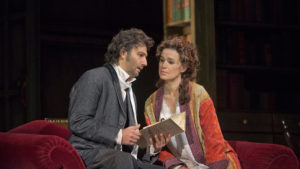
Jules Massenet’s music has never moved me. It’s too thickly orchestrated, and his choice of dramas too extreme. Werther, easily Massenet’s best opera, filled with romantic melodies and dissonant outbursts, bears the melodramatic hallmarks of late 19th-century French music.
The Metropolitan Opera will be streaming Werther, for free, this Sunday, Sept. 13, starting at 7:30. In spite of its flaws, it’s worth tuning in.
The cast is stellar. Jonas Kaufmann in the leading role has everything a tortured romantic hero should: a beautiful tenor voice with gravitas and lightness, good looks, and superb acting ability. Sophie Koch, making her Met debut as Charlotte, is wonderful. Her voice flows like velvet, and she is primly believable in her determination to keep her promise to marry the boring but stable Albert. In this production, from March 2014, Lisette Oropesa as Charlotte’s younger sister is sweet and fresh, inserting needed moments of relief.
The story is a tragic love triangle: a young man in love with a married woman sees death as the only solution. He cannot commit murder, so he kills himself.
The opera is based on The Sorrows of Young Werther, written in 1774, more than 100 years before Massenet’s version. Author Johann von Goethe, age 24, was himself hopelessly in love with a married woman, and the book created an enormous sensation, inciting copycat suicides. This “Werther Fever” prompted Denmark and Italy, among other locales, to ban the book. In 1775, the city of Leipzig not only prohibited its sale but banned the wearing of Werther’s outfit: yellow pants with a blue waistcoat.
Massenet finished his opera in 1887, but the director of the Paris Opéra-Comique rejected it as too “gloomy.” Massenet put Werther aside and focused on other works. The Imperial Vienna Opera staged the premier in 1892 to great acclaim, with the composer conducting.
This Met production by Sir Richard Eyre, with its video projections, is fascinatingly literal. Eyre sets the opera in the late 19th century and fills in the gaps in the story by using high tech and realistic special effects. The foreboding music in the overture is accompanied by a flashback to the death and funeral of Charlotte’s mother — artistic license, as this does not appear in the original staging directions. Throughout, Eyre’s visual concept brings the action as close to the audience as possible through a series of skewed framing devices, which are both innovative and metaphorical, as Werther’s emotional stability teeters as well.
The projections change the mood. In Act I, the children are eating cake by their house, and Charlotte is on her way to the ball. With no set change, just the addition of some candles, a change in the projections puts the action at the glamorous ball. Then, just as suddenly, Charlotte and Werther are walking home under the trees.
Prepare yourself for a CSI-worthy blood spatter at the end of the opera. Eyre has Werther shoot himself through the heart (naturally), rather than in the head as the original directions specify. In true operatic form, Werther continues to sing for a good 20 minutes.
The music is through-composed: episodes are linked as in a picture book. Often, when Massenet repeats a melody in the orchestra, the singer sings another line on top of that music, allowing for thematic variation.
Finally, Massenet’s orchestra makes the unusual inclusion of the saxophone. The saxophone is not often used in Western classical opera, as it was not invented until 1846. It appears in Act III, in Charlotte’s aria “Va! Laisse couler mes larmes” (“Go, let my tears flow”), and serves to underscore its mournful meaning.
I prefer Italian opera, with succinct stories about ordinary people and circumstances. The Parisian audiences of the time demanded complicated dramas with thick scores and extreme stories, and Massenet obliged. In Werther, there are beautiful melodies, great theater, and, in this production, the singing is fantastic.
N.B.: Be sure to watch the interviews at the end. You’ll see Jonas Kaufmann out of character, smiling and laughing — such a relief!
The synopsis here: metopera.org/discover/synopses/werther/ and a link to my opera talk here, starting Friday: youtube.com/channel/UChS8HFPW-43dy7-y2zW1XBA.
Désirée Elsevier has been a violist in the Metropolitan Opera Orchestra since 1987.
